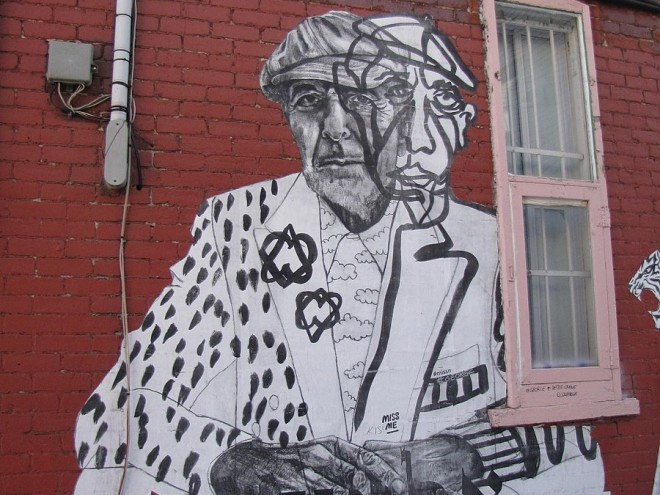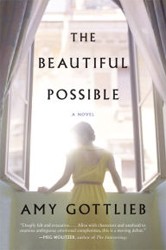Earlier this week, Amy Gottlieb described the “beautiful, perceptive” women around her mother’s kitchen table who inspired The Beautiful Possible. Amy is blogging here all week as part of the Visiting Scribe series on The ProsenPeople.
I arrived in Manhattan in 1982, fresh from a master’s program in comparative literature for which I had written a thesis on ice as a metaphor for the written word in One Hundred Years of Solitude. As a young writer, I was inspired by Garcia Márquez’s epic masterpiece: the Buendia family of Macondo suggested the crazy logic of my own Jewish family. I had a grandmother who forgot the meaning of words, a grandfather whose homemade borscht turned a mystical shade of red, and a cousin who predicted the exact moment I would arrive at her village in southern France, unannounced; in one of our more surreal episodes, my father  hid the afikomen at a Passover seder nine months before he died, and it fell out of the fireplace on a Yom Kippur afternoon two years later. I set out to write a Jewish version of Macondo based on my family’s implausible stories, and the mentor I identified was Isaac Bashevis Singer.
hid the afikomen at a Passover seder nine months before he died, and it fell out of the fireplace on a Yom Kippur afternoon two years later. I set out to write a Jewish version of Macondo based on my family’s implausible stories, and the mentor I identified was Isaac Bashevis Singer.
I was living in a furnished room on West 86th Street, a few blocks from Singer’s apartment. I began to write him a note of introduction, fantasizing about sharing a vegetarian meal at the Famous Dairy Restaurant, when I read an interview in which he said, “If Tolstoy lived down the street I wouldn’t try to go see him. I would rather read what he writes.” I took this as a sign, tore up the note, and kept reading his work.
In 1991 I was newly married, living in Berkeley, and spent a month off-the-grid at an artists colony in the southern California desert. At night I would lie awake in my cabin, listening to the coyotes howl in the canyon, and during the day I worked furiously on my first novel, which began in a shtetl and centered on a love affair between distant cousins — based loosely on a what-if story in my family’s history. When my retreat was over, I made my way to the airport and picked up a newspaper with the headline: “I. B. Singer, Narrator of Jewish Folkways, Dies.” I mourned him on the plane and then wrote three words in my journal: Your turn now.
A few years later, my first son was born, and I decided to put my flawed first novel in a drawer, convinced I could do better. I began to make a living as a Judaica editor, which gave me a foundation in Jewish texts. At the same time, I adopted many other literary mentors: Toni Morrison, Grace Paley, Michael Ondaatje, Virginia Woolf, Marilynne Robinson, J.M. Coetzee, Anne Michaels, Amos Oz — and my reading bloomed in a thousand directions, cross-pollinating genres, jumping from the ancient to the modern.
Two weeks before the publication of The Beautiful Possible, I invited my Rosh Chodesh group to serve as its first book club.The conversation veered in many surprising directions, landing on how Rosalie’s conflict isn’t expressed in ways that seem aligned with conventional notions of postwar Jewish-American guilt, and  suggests a commonality with works of modern Yiddish literature. This comment prompted me to revisit I. B. Singer’s fiction. I picked up Enemies: A Love Story and short stories I hadn’t thought about in decades. I returned to In My Father’s Court and noted the parallels between Singer’s early years eavesdropping on the adults who sought rabbinic counsel from his father and my own memories of listening to my mother and her friends at our kitchen table. I began to unravel the Hasidic threads in Singer’s work, as expressed by characters wrestling with existential doubt and physical desire.
suggests a commonality with works of modern Yiddish literature. This comment prompted me to revisit I. B. Singer’s fiction. I picked up Enemies: A Love Story and short stories I hadn’t thought about in decades. I returned to In My Father’s Court and noted the parallels between Singer’s early years eavesdropping on the adults who sought rabbinic counsel from his father and my own memories of listening to my mother and her friends at our kitchen table. I began to unravel the Hasidic threads in Singer’s work, as expressed by characters wrestling with existential doubt and physical desire.
Singer’s influence was alive in my novel, after all. My mentor had returned to me, hidden for a time, and then revealed — just like the afikomen that slipped out of the fireplace that Yom Kippur afternoon.
Amy Gottlieb’s fiction and poetry have been published in many literary journals and anthologies. She has received a Literary Fellowship and Residency from the Bronx Council on the Arts, and an Arts Fellowship from the Drisha Institute for Jewish Education. She lives in New York City.
Related Content:
- Life on Sandpaper by Yoram Kaniuk
- Helen Maryles Shankman: Trivializing the Holocuast?
- Interview with Sigal Samuel, author of The Mystics of Mile End
Amy Gottlieb is the author of the novel The Beautiful Possible, which was a finalist for the Edward Lewis Wallant Award, Harold Ribalow Prize, and a National Jewish Book Award. Her poetry has appeared in On Being, Ilanot Review, One (Jacar Press), SWWIM, Bloomsbury Anthology of Contemporary Jewish American Poetry, and elsewhere. She lives in the Bronx.




